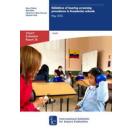
Validation of hearing screening procedures in Ecuadorian schools
3ie Impact Evaluation Report 26
Approximately 90 per cent of children with hearing loss are found in developing countries. If it is not detected early in life, children who are deaf or hard of hearing lag behind their peers in social and cognitive development as well as in the learning of languages.
In this impact evaluation in Ecuador, Karen Muñoz, Karl White, Catherine Callow-Heusser and Eduardo Ortiz assess the effectiveness of the teacher-administered hearing screening questionnaire Tamizaje Auditivo Escolar in public schools. They do this by comparing the results of the questionnaire against what is considered the international gold standard for hearing screening: pure tone audiological testing.
The study finds that the Tamizaje Auditivo Escolar programme fails to identify the majority of children with permanent hearing loss. The authors recommend that if the programme continues, significant systematic improvements need to be made in teacher training, protocol adherence, reducing follow up attrition, and expanding access to diagnostic services.




